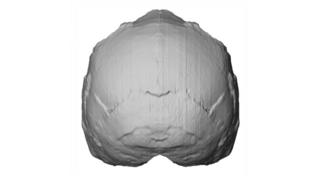 Image copyright
Image copyright
Katerina Harvati, Eberhard Karls Uni Tüb
Apidima 1 (shown here in a reconstruction) has all the characteristics of a modern human skull
Researchers have found the earliest example of our species (modern humans) outside Africa.
A skull unearthed in Greece has been dated to 210,000 years ago, at a time when Europe was occupied by the Neanderthals.
The sensational discovery adds to evidence of an earlier migration of people from Africa that left no trace in the DNA of people alive today.
The findings are published in the journal Nature.
Researchers uncovered two significant fossils in Apidima Cave in Greece in the 1970s.
One was very distorted and the other incomplete, however, and it took computed tomography scanning and uranium-series dating to unravel their secrets.
The more complete skull appears to be a Neanderthal. But the other shows clear characteristics, such as a rounded back to the skull, diagnostic of modern humans.
Modern humans left Africa much earlier
What’s more, the Neanderthal skull was younger.
“Now our scenario was that there was an early modern group in Greece by 210,000 years ago, perhaps related to comparable populations in the Levant, but it was subsequently replaced by a Neanderthal population (represented by Apidima 2) by about 170,000 years ago,” said co-author Prof Chris Stringer, from London’s Natural History Museum.
Apidima 2 appears to be a Neanderthal and is later than the modern human skull
People living outside Africa today trace their ancestry to a migration that left the continent 60,000 years ago.
As these modern humans expanded across Eurasia, they largely replaced other species they encountered, such as the Neanderthals and Denisovans.
But this wasn’t the first migration of modern humans (Homo sapiens) from Africa.
Homo sapiens fossils from Skhul and Qafzeh in Israel were dated in the 1990s to between 90,000 and 125,000 years ago.
These were viewed as anomalies – a brief foray outside our African homeland that came to very little.
However, in recent years, we’ve come to understand that our species ranged outside Africa even earlier and further than we’d previously believed.
In the last few years, palaeontologists have discovered modern human fossils from Daoxian and Zhirendong in China dating to between 80,000 and 120,000 years ago.
DNA studies have turned up signs of early interbreeding between African humans and Neanderthals. Evidence from German Neanderthals shows that mixing occurred between 219,000 and 460,000 years ago, although it’s not clear if Homo sapiens was involved, or another early African group.
Follow Paul on Twitter.












